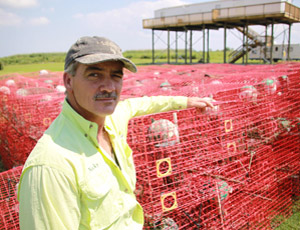Lafitte resident Lanvin LeBlanc has been fishing his entire life. With more than three decades of shrimping under his belt, he single-handedly runs a 38-ft skiff to bring thousands of pounds of shrimp to market each year.

When officials closed the waters to commercial and recreational fishing between the mouth of the Mississippi River and Pensacola Bay in Florida on May 2, LeBlanc was essentially put out of business.
“Everything has just been up in the air. This is all I’ve done my entire life. I’m 52 years old and I’ve only worked a job twice in my life for a couple of months during the winter,” said LeBlanc.
In Louisiana alone, commercial fishing is a $2.5 billion industry. In places like Lafitte, Shell Beach, Venice and Delacroix, it is the lifeblood of the community. Along with thousands of fishermen, hundreds of other small businesses such as marinas and seafood distributors depend on the shrimp, oysters, crabs and fish in the surrounding waters.
“The fishermen can not go through another Katrina. If this oil kills our seafood, who knows how many years it will take to come back,” said commercial fishermen Nicky Alfonso.
Alfonso runs his skiff out of the tiny village of Delacroix and usually fishes the waters along the mouth of the Mississippi. Outside of the shrimping season, he fishes for oysters and crabs.
Alfonso said most of his peers are barely hanging on and many had just dumped money into nets and maintenance on their boats in preparation for the season. And in their industry, everyone counts on having a good cash flow in the summer months.
“Everything we have as commercial fishermen is invested in what we own,” said Alfonso.
BP has hired more than 700 fishermen to help in the cleanup, but LeBlanc said he hasn't heard of many people actually getting work. He took two classes, sent in his contract and is hoping for a call. LeBlanc would earn $1,500 a day, plus fuel costs for 24 hours. Alfonso, though, is concerned about having to pay for his gas up front. That alone can run $600 per day.
“I worked for an oil company once before when I had my 90 foot boat and it took me 130 days to get a check. I'd rather just fish," said LeBlanc.

Post a comment to this article
Report Abusive Comment